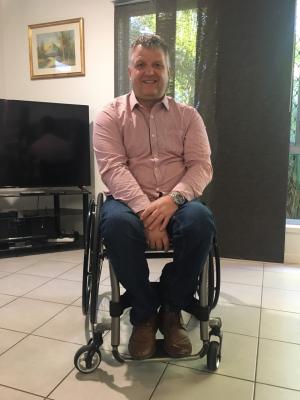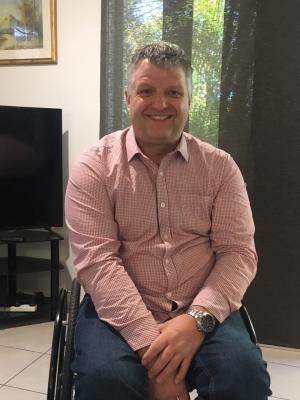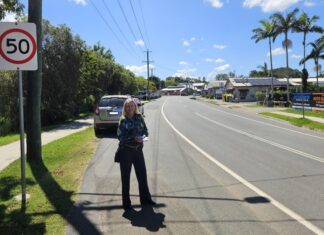On a sunny Thursday afternoon 18 years ago in his hometown in England, Darron Shields pulled on his cycling shoes and set off on his bike for a training session.
A ride that would change his approach to triathlons, and life, forever more.
In a life-altering moment, Darron went from triathlete to paraplegic as a result of an accident with a motor vehicle during that training session.
“When I came to and tried to sit up, I couldn’t,” Darron recalled.
“In that moment, I felt a strange sense of calm, or perhaps it was more that I knew I would now face an entirely different reality as a paraplegic, or maybe I just knew that I needed to lie still, or the situation would be life- threatening. Perhaps it was all those things,”Darron sustained a T5 spinal cord injury (SCI) that resulted in paraplegia. Surgery and rehabilitation were lengthy, from 14 days in intensive care to eight months in spinal rehabilitation, learning again to get dressed, to eat, to move around in a wheelchair.
Relearning the many daily tasks previously undertaken without thought now took effort, concentration, and patience. Darron’s prolonged hospital residency gave him the opportunity to reflect, and also focus on what he needed to do to adapt to life as a paraplegic.
Ever the optimist with a zest for life, Darron refused to take his new-found circumstances lying down. Instead, 18 months after his life was flipped on its head, Darron and his family migrated to Australia where he returned to university and gained a degree in sports science.
Fuelled by his ongoing passion for sport, and in particular triathlons, Darron trained for competition – initially with hand-cycling, and ultimately, a return to his first love, triathlon events. His achievements have proven him to be inspirational athlete who refused to inhabit the ‘victim’ label.
In 2010, eight years after the accident, Darron made a triumphant return to triathlon as a para-triathlete.
He achieved his goal of completing the Noosa Olympic distance triathlon within 10 years of his accident.
Over the last 18 years Darron has aimed to complete a milestone each year and focus on what can be achieved after a SCI.
“So, for this year I thought about what that might look like,” he said.
“So, somehow eighteen years equates to 180 kilometres on the bike. I decided to do two 90k rides back to back, and, as it happened, in the cold and the rain. On the second day I found myself slowing down on the final leg when I only had two or three kilometres to go. I was going that slow in the rain and I didn’t know why but when I finished, I noticed my back tyre had gone flat and I hadn’t even realised. Pure mindset,” Darron laughed.
It is this mental fortitude that enabled Darron to complete such an arduous undertaking. And it is that very same mindset that sees Darron living a positive, empowered and fulfilled life.
He has since completed 12 para-triathlons, competed in the 2010 and 2012 world para-triathlon championships and was the first para-triathlete to compete in the Sunshine Coast 70.3 ironman.
These days Darron works as the Business Development Manager for the Paraplegic Benefit Fund where they hold Safety awareness programmes within schools and workplaces on SCI prevention. PBF offers crucial financial support to its members in the event of a SCI such as Darron sustained.
Darron is also a member of the 121 Care management committee where he said, he is inspired by other members and the important work the organisation does in supporting those in the community with disabilities, including SCIs.
121 Care was founded in 1992 by a group of people living with disability as a result of SCI, who were looking to maintain an independent life at home with supports provided as and when they needed.
The philosophy of 121 Care matches Darron’s in terms of helping people with disabilities maintain independence as well as connection to the community so when he was offered a seat on the committee, he accepted because he knew how important it was to the organisation as well as himself to have members with lived experience with disability, contributing to the future of care and supports for its clients.
“Having a committee that is acutely aware of what life is like living with a disability means 121 Care can truly understand the needs of their members and therefore provide appropriately tailored services,” he said.
He added that other organisations who do not have this approach within management may not fully recognise the needs of their clients.
“121 Care put members first, it’s all about their members. What attracted me to 121 Care is that the committee has knowledge and understanding of the lived experience of disability and can therefore meet the needs and requirements of members through the services they provide. And those services are provided by the skilled employees that 121 Care trains to the highest level in the care industry,” he said.
For Darron, his work has a twin purpose. To share the message of safety to ensure what happened to him doesn’t happen to anyone else. But also, to show people with SCIs that you can still live a good life. In the work he does and the sport he is passionate about, Darron has taken a life-altering event and used it to grow and evolve – gaining inner strength and giving back more than he ever thought possible.
Spinal Cord Injury Awareness week is held from 7 to 13 September and according to Spinal Cord Injuries Australia, over 15,000 Australians live with spinal cord injury for which care is estimated at approximately $2 billion annually.
Eighty percent of cases incurring SCIs are males and the major causes of traumatic injury are land transport crashes including vehicle occupants, motorcycles, pedestrians, pedal bikes and quad bikes, followed by falls, water relates accidents, sports, horse related and falling objects.










